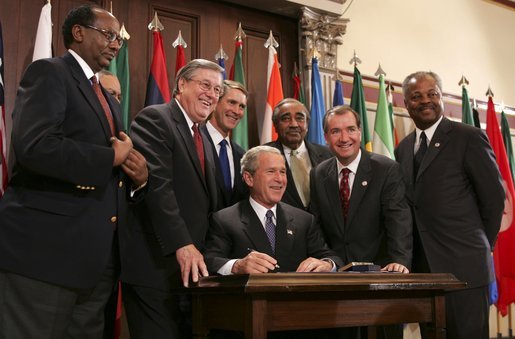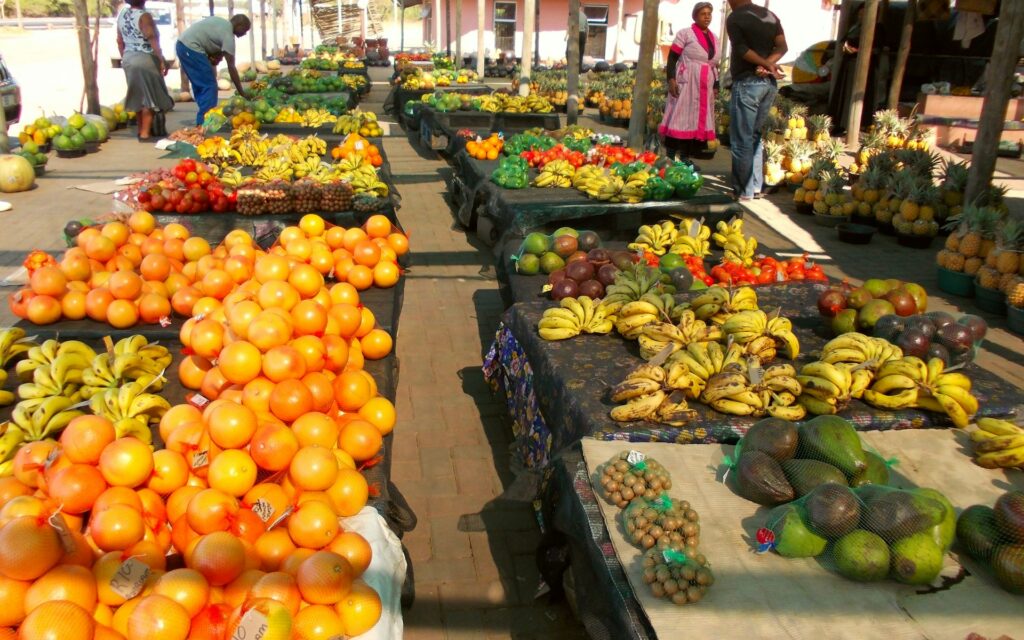The African Growth and Opportunity Act is the backbone of US economic policy and commercial engagement with Africa. In the past 24 years, this Act has promoted both political and economic reform throughout Sub-Saharan Arica, but in September 2025 AGOA benefits are set to expire.

What is AGOA?
Essentially, the Act is “a long-term commitment that provides duty-free access to the US market for eligible African countries.” More than just a trade agreement, AGOA seeks to support African economies and social reform. For example, the Act requires participants to establish free trade markets and build trade-based economies. It stipulates that countries establish political pluralism and the right to due process. It also insists that participants enact policies to reduce poverty, combat corruption, and protect human rights. Finally, AGOA requires that participants eliminate barriers to US trade and investment.
By providing new market opportunities, AGOA has helped bolster economic growth, promote economic and political reform, and improve US economic relations in the region.
– USTR, Office off the United States Trade Representative
Currently there are 32 eligible countries, all in Sub-Saharan Africa. Enacted in 2000 by President Clinton, it was further modernized and extended in 2015, but without further negotiation and renewal the agreement will end in 2025.
Implementation
While there certainly have been some success stories, and trade between Africa and America has greatly increased, many Sub-Saharan countries lack the infrastructure to take full advantage of the program.

Namibia has reached success through the program in recent years with the exportation of beef, while in South Africa automobile manufacture as well as agriculture (such as citrus, which reached some $475 million in exports in 2023) have seen success with AGOA. Lesotho and Kenya, as other examples, have achieved great success through the program exporting clothing for companies such as Old Navy and Walmart, creating tens of thousands of unskilled jobs (mostly performed by women). As expiration of AGOA looms nearer, these and other countries are having to consider a future without the program. An increase in tariffs could easily translate into African products being less competitive in the American market, resulting in reduced export revenues and job loss. Furthermore, continuing export growth post-AGOA will be increasingly difficult for countries such as Lesotho, that will be challenged by other low-wage competition in Asia as well as elsewhere in Africa.
Want to Know More?
This UNCTAD 2023 Report is a detailed review of AGOA (PDF)
Critique
Proponents off the Act highlight its intent to stimulate African economies and improve human rights, while critics point out the limited success in some of these areas as well as the exploitative manner in which AGOA has been applied thus far. It is worth noting that in Lesotho’s case, for example, that little reduction in poverty has been seen in spite of the country’s success through AGOA. In fact, World Bank suggests that diversifying its market and future participation in a Continental Free Trade Area could provide more hope than a continuation of AGOA.

One key criticism of AGOA is the requirement of beneficiaries to remove trade barriers to U.S. imports. Critics indicate that flooding local markets with American goods has adversely affected local markets and undercut local producers. Furthermore, while clothing, oil and mineral extraction, and auto manufacturing have thrived under AGOA, many of the jobs created – especially those requiring skilled labor such as project managers and engineers – are not filled by Africans but are recruited from more developed countries. What jobs have been created prey on vulnerable populations in areas where child- and labor laws are scarce.
Although AGOA purports to leverage exports as a way of boosting economic development in Africa, it does not stipulate that the exporting companies must be African. Indeed, most of them are American, Chinese, an Indian. The vast majority of beneficiaries under AGOA are not impoverished Africans, but wealthy foreign corporations.
Looking Ahead
The future of AGOA is uncertain. In the event of the program’s suspension later this year, beneficiaries could face local businesses who are reliant on the export market failing, as well as significant decreases in direct foreign investment. This does not mean that all hope for Africa and her marketplace is gone, however. The establishment of the African Continental Free Trade Area (AfCFTA), an African endeavor to unify all 55 African Union (AU) countries in the largest free trade area in the world, would reduce reliance on the U.S. market, strengthen partnerships with neighbors, and encourage investment in local industries.
Want to Know More?
Check out this World Bank article!
Further extension of AGOA could continue to benefit both Africa and America, strengthen ties between the regions, and foster growth socially as well as economically. As for the AfCFTA, currently 49 counties have ratified it and 12 have already implemented it. A brighter future for African economies glimmers on the horizon; if this program lives up to its potential, it could encourage diversification of African markets, boost intra-Africa trade, and create more resilient economies that are tangible presences on the global trade landscape rather than scrambling for low-wage manufacturing contracts. Change is often slow, but just perhaps we will be able to witness the potential of AGOA and ACFTA together come to fruition or the betterment of not only national economies, but for all the people struggling to overcome poverty in Africa.
Resources:
Mashariki Research and Policy Centre | The Future of AGOA: Opportunities and Challenges Post-2025
Young African Leaders Initiative | African Growth and Opportunity Act
World Bank | Small African Economies in a More Uncertain Global Trade Environment (PDF)
Aluma Capital (Pty) Ltd | South Africa’s Trade Relations with the United States
Third Eye Analyst | The Impact and Challenges of the African Growth and Opportunity Act (AGOA)
Brookings | Here’s why US-Arican trade under AGOA has been successful for some countries but not others
Brookings | How the Biden administration can make AGOA more effective
Brookings | US-Africa trade relations: Why is AGOA better than a bilateral free trade agreement?
Brookings | The African Continental Free Trade Area is a game changer or both African and global economies
